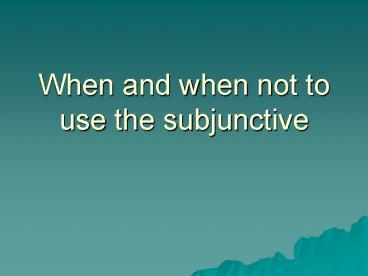When and when not to use the subjunctive PowerPoint PPT Presentation
1 / 15
Title: When and when not to use the subjunctive
1
When and when not to use the subjunctive
2
Subjunctive vs. Indicative
- Use the subjunctive when there is doubt
- No creo que hayan visto la estatua de la
libertad. - No es cierto que mis abuelos puedan venir a la
celebración. - Ella no pensaba que el desfile pasara en frente
de su casa.
3
Doubt
- Expressions of doubt include
- No es verdad que
- Es dudoso que
- Dudo que
- No pienso que
- No creo que
- No es cierto que
- Es improbable que
- Note these expressions can also be used in past
tenses (No pensaba que... etc)
4
Subjunctive vs. Indicative
- Doubt
- Era dudoso que llegáramos a tiempo.
- Certainty
- Era cierto que la fiesta empezaba a las ocho.
5
Certainty
- Dont use the subjunctive following expressions
like - Es cierto que
- No hay duda que
- Pienso que
- Creo que
- Es verdad que
6
Expressions of emotion
- Lo siento que hayas perdido tu billetera.
- Es una lástima que no puedas ir a Panama City
para las vacaciones de primavera. - Ojalá que ganes la competencia.
- Me alegro de que hayas ganado la competencia.
- Me gusta que me cuentes tus secretos.
- No me gusta que mis profesores me den mucha tarea.
7
Cuando
- Use the subjunctive when there is a command or
the action takes place in the future. - Command
- Apaga la luz cuando salgas.
- Cuando llegues al aeropuerto, llámame
- Future
- Cambiaré mi carro cuando esté viejo.
- Iré a España cuando tenga suficiente dinero.
8
Cuando
- Use the indicative when you are talking about a
past action that actually took place. - Cuando fui a España, visité el Alcázar.
- Cuando vi a tu hermano, no lo reconocí.
9
Tan pronto como / En cuanto(as soon as)
- Use indicative if the action actually took place
- Tan pronto como terminó su tarea, encendió la
televisión. - En cuanto entró al carro, cerró la puerta.
- En cuanto aterrizó el avión, los pasajeros
bajaron.
10
Cuando
- Use the indicative when you are talking about
habitual action or cause effect. - Cuando estudio, saco buenas notas.
- Cuando llamo a mi perro, él viene corriendo.
- Cuando hay una tormenta, mi perro tiene miedo.
- Cuando el verano llega hace calor.
11
Tan pronto como / En cuanto
- Use subjunctive if the action has not yet
happened. - Llámame en cuanto sepas los resultados del
examen. - Él quería llamar a sus padres en cuanto supiera
los resultados del examen. - Los turistas pensaban dar un paseo en cuanto
llegara el autobús.
12
Volition
- Querer
- Exigir
- Mandar
- Recomendar
- Aconsejar
- Decir
13
Decir
- Use subjuctive when someone says to do something
(volition). - Mi mamá me dijo que arreglara mi cuarto.
- El hombre dijo que siguiéramos por la avenida
Constitución. - Le dije a Mónica que se pusiera el vestido azul.
- Paquito, mamá dice que vuelvas a la casa.
14
Decir
- Dont use the subjunctive when you are simply
saying what someone said. - Elena dijo que el desfile comienza a las diez.
- Mi mamá dice que mi cuarto está sucio.
- El periódico dice que va a llover mañana.
- El señor dijo que el hotel estaba en la calle
Colón.
15
YOUR SENTENCES
- Doubt
- 1 present tense
- 1 past (either present perfect or imperfect
subjunctive) - No doubt
- 1 present tense
- 1 past (any of the past tenses)
- Cuando
- 1 command
- 1 future
- 1 cause effect
- 1 habitual action
- 1 action in the past
- Decir
- 1 subjunctive (say to do something)
- 1 indicative (say what someone/something says)

